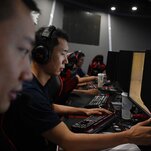
Rift Between Gaming Giants Shows Toll of China’s Economic Crackdown
Alexandru Voica, a NetEase spokesman, said NetEase had moved on, and “we suggest Activision Blizzard do the same.”
- Horror Remakes: New versions of Resident Evil 4 and Dead Space illustrate the challenges that developers face when immersing players in terrifying yet familiar worlds.
- A Video-Gaming School: Japan’s first e-sports high school thought it would turn out pro gamers. Instead, it attracted an unexpected demographic: absentee students.
- The Business of E-Sports: Despite competitive video gaming’s growth and appeal to the young consumers, traditional sports owners who have invested in the industry say the money has not followed.
Since 2020, China’s antitrust regulators have been reviewing old mergers and joint ventures that drew large amounts of foreign capital. New antitrust amendments last summer significantly raised the fine for failing to comply with those reviews.
Last year, NetEase executives asked Activision to file relevant disclosures, such as annual revenues and details about parts of its business, to Chinese regulators, but Activision disputed that it was out of compliance with the law or that it was required to turn over more information, according to four people with knowledge of the situation and documents viewed by The Times.
In the contract renegotiations with Activision, conducted every few years since the partnership started, NetEase said it wanted to end the companies’ joint venture agreement — a business entity that helped NetEase distribute games from Blizzard Entertainment, an Activision subsidiary, in China. NetEase said it wanted Activision to license its games directly to NetEase, which would give NetEase more control over operations and allow it to better comply with the new regulations without Activision’s help.
Andrew Tang, a veteran gaming executive in China with close ties to Activision, said he thought NetEase was simply using the antitrust regulations as an excuse to get a better deal.

